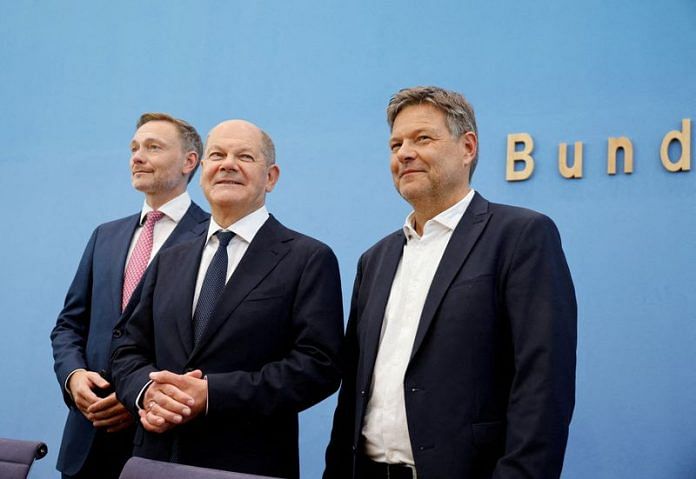By Sarah Marsh and Thomas Escritt
BERLIN (Reuters) -Germany’s economy minister made a key concession in talks over how to plug the budget on Monday in a bid to save the ruling three-way coalition which faces a make-or-break week amid differences over how to revive the ailing economy.
Chancellor Olaf Scholz’s Social Democrats (SPD), Economy Minster Robert Habeck’s Greens and Finance Minister Christian Lindner’s Free Democrats (FDP) have been at odds for months over how best to plug a multi-billion euro gap in the 2025 budget.
The dispute is linked to different strategies to revive an economy still grappling with higher energy prices due to the end of cheap Russian gas and stiff competition from China eroding its business model.
In recent, weeks Habeck and Lindner presented plans that were completely at odd with one another while Lindner and Scholz held rival business summits, underscoring the breakdown in cooperation.
This week is considered crunch time for the coalition with cabinet set to discuss an array of economic measures on Wednesday.
Scholz received Habeck and Lindner in his office for the first of a series of discussions before the meeting.
“The last few days have produced a cacophony rather than a united government line,” Habeck acknowledged in a news conference late on Monday.
“The important thing is that if we don’t get the budget right, if the budget fails, then we will enter into a prolonged impasse in Germany … at the worst possible time.”
This would require concessions, he said. He then announced that he would now support funds that are no longer needed to subsidise Intel’s new chip-making plants, after it postponed construction, being used to balance the books.
This was something Lindner had long pushed for, but Habeck had resisted, saying the nearly 10 billion euros were due to come from the off-budget climate and transformation fund, meaning they were not available to plug the regular budget.
NEW ELECTION POSSIBLE
A coalition collapse could leave Scholz heading a minority government and relying on ad hoc parliamentary majorities to govern, or trigger an early election – which surveys suggest would be disastrous for all three coalition parties.
The SPD and Greens are polling well below their scores in the 2021 election, while the FDP could be ejected from parliament altogether.
The conservatives, on 36%, currently lead in surveys, followed by the far-right Alternative for Germany on 16%. Parliament’s term is due to end next September.
Earlier in the day FDP General Secretary Bijan Djir-Sarai had refused to rule out the coalition collapsing if FDP demands for spending cuts and a softening of climate regulations were not met.
The free-market party had surprised its partners on Friday with a budget document that proposed tax and spending cuts and deregulation as the answer to Germany’s economic malaise.
“The economic policy we’ve had until now has failed,” Djir-Sarai told reporters. The FDP’s proposals would undermine core Greens ambitions, postponing by five years to 2050 the target date for making the economy climate neutral and abolishing a climate protection fund.
But SPD co-leader Saskia Esken told reporters: “I can’t see any proposals there that are suitable for implementation by a Social Democrat-led government.”
The centre-left SPD and Greens, themselves at odds on a host of issues, agree that targeted government spending is needed to stimulate the economy, and reject the FDP’s supply-side focus.
Scholz declined to be drawn on the dispute, telling a news conference that the budget needed to be finalised. “It’s important to focus on jobs and the economy,” he said.
SPD general secretary Matthias Miersch said he was optimistic that a deal would be reached, adding that the parties would have even more responsibility to ensure stability if Donald Trump won Tuesday’s U.S. presidential election.
Greens co-leader Omid Nouripour rejected any softening of climate goals but added: “We don’t want to break the coalition … We expect the others also to stick to their commitments.” ($1 = 0.9181 euros)
(Reporting by Sarah Marsh, Matthias Williams, Andreas Rinke and Christian Kraemer; Editing by Ros Russell, Kevin Liffey and Alison Williams)
Disclaimer: This report is auto generated from the Reuters news service. ThePrint holds no responsibilty for its content.



